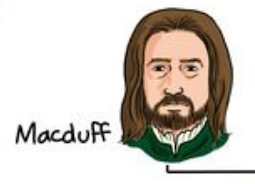Today, Macbeth is most famous for being the protagonist of William Shakespeare's play Macbeth and the numerous works that it has influenced.
Shakespeare's Macbeth, however, is not historically accurate because it is based on Holinshed's Chronicles, which was released in 1577.
All the characters from Macbeth are listed below.
Macbeth:
He is easily persuaded to murder to achieve his aspirations for the throne, and once he does so and is anointed King of Scotland, he proceeds to perpetrate other atrocities with growing easiness. Because he lacks the abilities essential to rule without becoming a despot, Macbeth ultimately demonstrates that he is better suited to the battlefield than to political intrigue. He resorts to violence and murder as a solution to every issue.
Unlike some of Shakespeare's greatest villains, such as Iago in Othello and Richard III in Richard III, Macbeth never feels at ease playing the bad guy. He is unable to handle the psychological fallout from his crimes.
Lady Macbeth:
The wife of Macbeth is a very ambitious woman who craves status and authority. She gives off the impression of being the stronger and more cunning of the two early on in the play when she implores her husband to kill Duncan and take the throne. But as the bloodletting starts, Lady Macbeth suffers from remorse and lunacy even more than her husband. She becomes so burdened by her conscience that she ends up killing herself.
A lot of Lady Macbeth's words imply that her power over her husband is purely sexual, which is interesting given that she and Macbeth are shown as being profoundly in love. Their shared separation from the outside world, brought on by their partnership in crime, appears to make them more attached.
A trio of witches:
Three "black and midnight hags" who use charms, spells, and predictions to destroy Macbeth are described in the play. He is influenced by their prophecies to murder Duncan, to have Banquo and his son killed, and to have naive faith in his immortality.
Apart from the notion that they are Hecate's slaves, the play is vague concerning the witches' true identities and their role in the cosmos. They resemble the mythical Fates, who impersonally weave the threads of people's fate, in certain ways. They take a sick pleasure in playing with and destroying people by using their knowledge of the future.
Banquo:
The honorable, valiant general whose offspring will inherit the Scottish crown, following the witches' prophecy. Banquo harbors grandiose ideas, much like Macbeth, but he never takes any of them to heart. In a way, Banquo's persona serves as a reprimand to Macbeth since he symbolizes the course that Macbeth chose not to travel—one in which ambition need not result in treachery and murder.
King Duncan:
The virtuous King of Scotland whom Macbeth assassinates in his desire for the throne. Duncan is the epitome of a moral, kind, and wise leader. His passing stands in for the dissolution of a system of government in Scotland, which can only be brought back when Malcolm, a descendant of Duncan, reclaims the throne.
Macduff:
a nobleman from Scotland who has always opposed Macbeth's monarchy. He eventually assumes leadership of the campaign to remove Macbeth. The crusade's goal is to install Malcolm as the legitimate ruler, but Macduff also longs for retribution for Macbeth's killing of his wife and little son.
Lady Macduff:
wife of Macduff. We barely get a glimpse of a household world outside of Macbeth and Lady Macbeth at the scene in her palace. Lady Macbeth and the horrible Inverness are contrasted with her and her house
Malcolm:
The son of Duncan, whose accession to the throne marks Scotland's restoration of peace after Macbeth's rule of terror. With the assistance of Macduff (and the backing of England), Malcolm emerges as a significant threat to Macbeth.
He first comes across as weak and unsure of his strength when he and Donalbain depart Scotland after their father is killed.
Hecate.
The goddess of witchcraft, who assists the three witches in playing tricks on Macbeth.
Fleance:
Son of Banquo who escapes Macbeth's assassination attempt. Fleance's whereabouts are a mystery at the play's conclusion. He might become Scotland's ruler, fulfilling the witches' prediction that Banquo's sons would hold the throne.
Lennox:
Scottish noble.
Ross:
Scottish noble.
The murderers:
a gang of criminals recruited by Macbeth to kill Fleance, Banquo, and Macduff's wife and children but fail to kill Fleance.
Porter:
The Macbeth's castle's inebriated doorman.











0 Comments
any query? please inform us